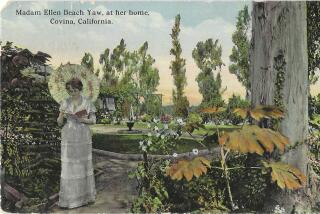The Most Beautiful Speaking Voice in Music : MABEL MERCER A Life <i> by James Haskins (Atheneum: $19.95; 217 pp.) </i>
- Share via
Mabel Mercer was a show-business maverick. Born at the turn of the century in Staffordshire, England, to an English-Welsh vaudeville singer (her father, whom she never knew, was a black American musician), she left school at age 14 to join an aunt’s act--as a dancer, because her “small, sweet soprano voice” was not deemed adequate for the British music hall stages.
On later jobs, she played the piano, even conducted an orchestra in London (disguised as a man, complete with monocle), but it was as a singer that she became the darling of the entre deux guerres set in Paris. Bricktop, Josephine Baker, Cole Porter, Django Reinhardt and Paul Robeson float through these pages, as do the Duke and Duchess of Windsor. When the homosexual Kelsey Pharr offered to marry Mercer in order to help her gain entry to the United States, it was the duke who helped expedite her emergency marriage license.
Author James Haskins seems to be of two minds concerning his subject’s voice. At one point, he claims that after a tonsillectomy in Paris, her singing returned to its earlier form; but he quotes others who believe that after the surgery “she became a diseuse ,” (a song “speaker”).
Haskins adds: “She was now in her early 40s. . . . Mabel really had no alternative but to continue singing. She had no other marketable skills to speak of.”
The legend clearly outlived the singer. By the time she died in 1984, Mercer had elicited the admiration of everyone from Frank Sinatra to Peggy Lee and had been awarded the Presidential Medal of Freedom by President Reagan. She enjoyed a fierce loyalty as the in cult singer of her day; it was unchic to ignore or denigrate her.
One has to read between the lines to infer that at least a measurable part of her success was due to her personal charm. Haskins quotes a friend: “She spoke the most beautiful English--grammatically correct, excellent diction--and she could talk about an enormous number of subjects.”
After the brief token marriage to Pharr, she had a long relationship with a well-to-do, married Jewish restaurateur whose death was one of a series of traumatic blows in her later years.
Haskins, a sort of fast-food, microwave biographer (yesterday Lena Horne and Bricktop, recently Corazon Aquino, now Mercer), has a facile style, but he never interviewed Mercer, and his prose never resonates with trenchant observations. He falls short of explaining in words how Mercer created her magic in music. As a consequence, the appeal of this biography will be limited largely to those who knew his subject well, and then only because of the endearing portrait drawn by some of her friends.
More to Read
The biggest entertainment stories
Get our big stories about Hollywood, film, television, music, arts, culture and more right in your inbox as soon as they publish.
You may occasionally receive promotional content from the Los Angeles Times.










